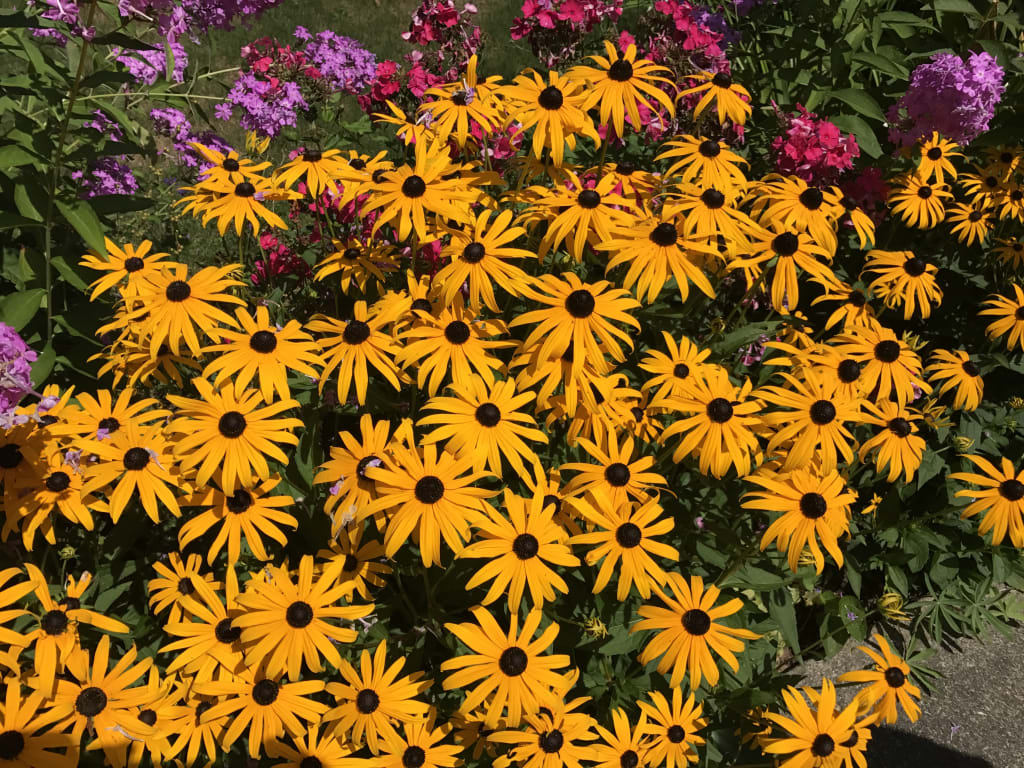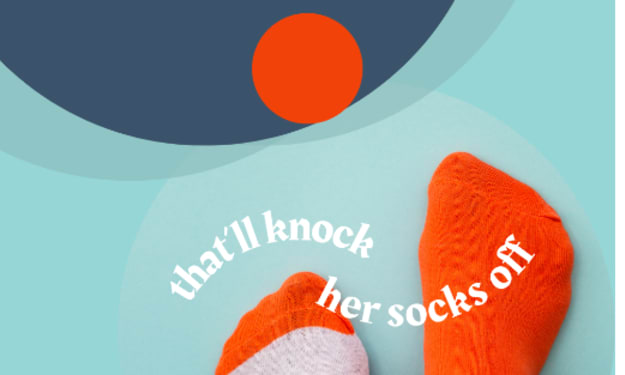Her Little Black Book
It was all that she needed to start down a new path.

It’s rare when the reading of a will is the highlight of your day. Jenny felt guilty about it but not much had been going well for her recently.
She just dropped out of her business program and spent her savings on a yoga weekend where she came to the conclusion that her boyfriend was dead weight. She left him at the train station that morning and went straight home to her brother’s place to change her clothes before heading to the lawyer’s office.
“Where have you been? We leave in five minutes,” Mike, her brother, snarled. She was barely even through the front door.
He sat at the kitchen table, staring at his half-empty coffee mug and arranging the crumbs from his morning muffin on his plate. He was wearing a dark suit with a black tie and white shirt.
“God, you smell like…nature,” he said with a hint of disgust.
“I just need 10 minutes,” Jenny sighed. “We’re not going to a funeral, you know. It’s a will reading. You could even wear khakis.”
“Hurry up!” He shouted over his shoulder. “I’ll be in the car.”
Jenny threw her backpack on the bed and looked for something cheerful and earthy to wear for the occasion. Uncle Bruce was an outdoorsman, adventurer, birder and, above all, a competent gardener. She decided on a floral dress with brown undertones. She’d be the one representing his love of the planet at this event.
Both Jenny and Mike took after their uncle in their own ways. Mike followed him in his civilian path, focused on making big money fast as an investment manager. Jenny was the one who shared his passions and pastimes. She smiled sadly at the thought of so many afternoons planting seeds and cutting flowers in backyard garden or sitting for hours on end just to see some rare local bird.
“Jenny! Let’s go! I’m warming up the car.” Mike shouted.
Jenny frowned. She might have to get used to this kind of daily conversation. One by-product of her hasty personal housecleaning over the past week was that she was going to have to move her stuff out of her boyfriend’s house and store it at Mike’s place. Part of the storage would include herself. Jenny had no home.
She grimaced and grabbed her purse. Is that all one brings to a reading of a will?
She looked over at the bedside table and saw her little black notebook and favourite pen. Hmmm—I’ll want to take notes, she thought. I might have to look up the legal terms later and I sure as heck don’t want to ask Mike.
Mike stayed grouchy in the car. Jenny watched the trees fly by as they zoomed down the highway.
“It’s been so long since we’ve been to Uncle Bruce’s farm,” she said.
“Yeah, too bad about the circumstances,” he said. “We used to go every summer.”
“He used to take us on those long hikes along the river and into town,” she remembered.
“That was fun,” Mike replied. “I liked it when he surprised us with a picnic whenever we got that lookout spot of his. Remember the one overlooking the town?”
Jenny smiled. “Yeah, he served us oysters or something and inevitably make some stupid joke like ‘the WORLD is your oyster, kids.’ Don’t forget!”
“Yeah,” Mike said. “Until you grow up and have to work.”
They were about an hour out of the city, pulling up to the farmhouse that was Uncle Bruce’s retirement home and final resting place.
They were greeted by Mr. Cushing, the executor and trustee of the estate. He would read the will. He was tall, thin, and bald with kind brown eyes and a sad smile. In his dark suit, he could easily have been mistaken for a friendly undertaker.
“I’m glad somebody dressed for the occasion,” Mike said as he parked the car on the tarmac by the barn.
Three other people were there, none of whom Jenny or Mike recognized. They were the only family members named in the will. The strangers looked like outdoorsy eccentrics from central casting—a birder with round glasses and wardrobe straight from the L.L. Bean catalogue, the aging hippie dressed head-to-toe in Patagonia, and the outlier, a true artsy dressed in all black with the exception of the lily-white scarf around his neck.
“Welcome, my friends,” said Cushing. “I’m glad to see the Wildman family represented. Our other guests are Misters James, John, and Jean-Marc.”
Everyone nodded soberly to one another. Cushing led them through the front door to the library at the centre of the house.
The library was very much to her uncle’s taste. Framed photos of the rare birds and full-grown flowers adorned the walls punctuated by his two big splurges in life—an original van Gogh on one wall and a Picasso on the other.
His bookshelf belied a taste for adventure tempered by a need to stay alert and sharp to the world of finance. Original copies of Peter Bernstein’s History of Risk and Ron Chernow’s biographies of bank titans sat in the same collection as first-edition Ernest Hemingway novels (except the bull-fighting ones, in principle) and Bruce Chatwin travelogues.
“Please sit, everyone,” Cushing said. They all took to their seats arranged a semi-circle around the desk.
Jenny pulled out her little black book and pen, tensing herself before Cushing shared the news. As she pulled the book from her bag, she noticed that Cushing raised his eyebrow, ever so slightly, and appeared, however vaguely, to smile.
He paused and nodded at her before establishing himself behind Uncle Bruce’s giant oak desk for the reading.
“Thank you for joining us today for this solemn occasion. We are here to read the final will and testament of Bruce John Wildman. From his family, his nephew and niece, Michael and Jenny, are with us. We are also pleased to welcome the executive directors of the local chapters of the Audubon Society, the Sierra Club, and the community art gallery.”
It was a short reading. The farmhouse and the bulk of his fortune was to be dedicated to creating an outdoor education centre. Jenny and Michael would sit on the board with the others in attendance and they would receive minor compensation in their roles as directors. Everyone could take one item from the library as a personal memento, but the bulk of the estate would be used to educate the public about the local ecosystem
It was getting to mid-afternoon and everyone seemed to have another place to be. After exchanging cards and numbers, the group prepared to depart. Jenny walked over to the bookcase to examine her new collection of first editions. Mr. Cushing joined her.
“I’m wondering if I might have a moment with you in private, Ms. Wildman,” he whispered.
She looked at him severely. What was his agenda? Lechery?
“Ah, sure. But what for?”
“There’s something else!” He whispered. “But it’s secret.”
Maybe lechery, she thought. She was curious, though.
“Are you coming?” Mike asked her.
I just need a moment with Mr. Cushing,” she told him. “Why don’t you take a walk around?”
“I’ll be in the car,” he said. “Don’t be long. I don’t want to get stuck in traffic.”
Cushing closed the door and led her back into the study. He opened one of the desk drawers and pulled out a little black book, not unlike the one Jenny had brought to the reading.
“Another notebook?” She exclaimed. “Well, you can certainly never have too many notebooks and I love that brand.”
“Clearly and that is why you are privy to this particular prize,” said Cushing. “Bruce wanted to have a bit of fun with his estate, though the bulk of his intentions have been dealt with today. He wanted to add something special for what he called “magic moments of serendipity.”
Jenny stifled a laugh. It certainly sounded like one of her uncle’s ideas. “Like what?”
“Well, just happy coincidences,” said Cushing. “As you know, he was a big believer in signs, omens, and symbols. To him, the objects that we use in our daily life speak volumes about the kind of people we are. That’s why he laid out a series of additional inheritances for anyone who fit the bill in his mind. Based on today’s meeting, you’re the only one.”
“How so?”
“Your little black notebook,” said Cushing. “To him, someone who brings a high-end paper notebook to any meeting is the sign of adventurer with a sound imagination, a writer in the rough. He told me that whoever appeared with a little black notebook would be the person chosen to play his great final game with him. He called it the Path to Adventure.”
Jenny was amused. “How do we play?”
“Have you heard of letter-boxing? It was a Victorian pastime. Basically, you hide some items in a box in a well-guarded hiding place and issue clues to help your fellow letter-boxers find whatever you have hidden in a field or a cave or by a brook or whatever.”
“Oh! It sounds like geo-caching.”
Cushing looked pleased. “Same principle, really, except you can’t use a GPS. You must follow the instructions in my little black book of clues. Here.”
She accepted the book and opened it to the first page. “Exit through the front door and walk to the edge of the farm where the creek flows by,” it said.
“The game starts now and you must finish it today,” said Cushing. “Please go. Good luck!”
He shooed her out the front door and waved lightly before closing the door and locking it shut with a loud clang.
“Ready?” Mike asked.
“No, I’ve been given a task,” she said. “You can come with me right now or drive off in the car, but I have to go find something today. It’s part of the will.”
“That sounds stupid, Jenny,” Mike exclaimed. “What are you trying to find?”
“Clues,” she said. “That’s all I know. Please come, Mike. I might get murdered along the way.”
Mike sighed. “Fine,” he said. “I don’t want you to get murdered.”
They walked to the edge of the farm and saw the river. Another clue was waiting, leading them east into the woods along a leafy path that seemed to be favourite for rabbits and deer.
That led to a new clue at a sugar shack where a local farmer gave them a maple syrup sample before sending them up the hill to the plateau that overlooked the local town. They got to the top and were pleasantly surprised by their old picnic spot from summers past.
“It’s the picnic place!” cried Jenny. She spun around with a forgotten joy. Mike stumbled after her through the field. They fell down in front of the old tree where they enjoyed so many meals with their uncle. The tree was dead, but there was an old cigar box inside.
Jenny reached in and pulled it out. She laid it on the ground so that Mike could see it, too. Four things were in the box—a folded piece of paper, a small stack of money, and a new Moleskine notebook.
“That looks like $20 thousand dollars,” Mike exclaimed. Jenny unfolded the note and read it aloud.
Dear Reader,
Congratulations on finishing this leg of the journey. If you are an adventurer, there are 100 similar boxes, hidden in other amazing places around the world. If you find each box undisturbed, you can collect up to $2 million dollars. If not, you will still have an enjoyable trip along the way.
The next stop in this adventure is Milan, Italy. Please write about what you find.
Bruce
Well, I know which option I’m going to take, Jenny thought.
“Time for an Italian vacation, sis?” Mike asked.
About the Creator
Brian Jantzi
I am writer based in Toronto, Ontario, Canada.






Comments
There are no comments for this story
Be the first to respond and start the conversation.